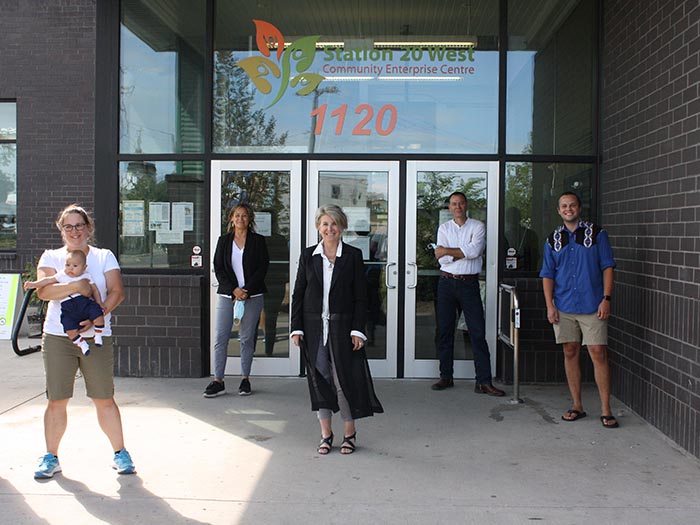Saskatchewan Network Environment for Indigenous Health Research
Innovative research facilitation, training and knowledge mobilization will help this NEIHR respect the health needs of Indigenous People in Saskatchewan
Dr. Caroline Tait
Professor, Department of Psychiatry, University of Saskatchewan

Representatives affiliated with the Saskatchewan NEIHR (from L to R): Dr. Heather Foulds, Assistant Professor, Kinesiology, University of Saskatchewan; Dr. Sheri McKinstry, Assistant Professor, College of Dentistry, University of Saskatchewan; Dr. Tait, Nominated Principal Investigator of the Saskatchewan NEIHR and the NEIHR National Coordinating Centre; Dr. Simon Lambert, Executive Director, NEIHR National Coordinating Centre; and Dr. Jaris Swidrovich, Assistant Professor, College of Pharmacy and Nutrition, University of Saskatchewan.
Through the Saskatchewan First Nations and Métis Health and Wellness Research, Training, and Knowledge Mobilization Network (First Nations and Métis Health Research Network), Dr. Caroline Tait, a Métis researcher, is working with colleagues to ensure that First Nations and Métis governments, communities and organizations have the resources to undertake research focused on their needs. In collaboration with primary partners, the Métis Nation-Saskatchewan and the Federation of Sovereign Indigenous Nations, and other stakeholders, this NEIHR first launched the First Nations and Métis Centres, to support Métis and First Nations-specific research, and respect their data sovereignty. Despite the COVID-19 pandemic, this NEIHR supported 13 community partnerships in 2020 so that university researchers and community organizations could develop large health research grant applications. The First Nations and Métis Health Research Network also supports two CIHR Indigenous Research Chairs, Dr. Holly Graham (Cree) and Dr. Heather Foulds (Métis), and, through its affiliated Indigenous Mentorship Network program, has established writing group sessions for students so that they can collaborate with researchers. This NEIHR is hiring Indigenous community researchers and facilitators to help university researchers and Indigenous partners identify research opportunities, develop grants and undertake research. As leads of the NEIHR National Coordinating Centre, Dr. Tait and Dr. Simon Lambert (Māori) are collaborating with NEIHR researchers across Canada on a national NEIHR evaluation strategy, and supporting national and international research collaborations.
“The Saskatchewan NEIHR’s First Nations and Métis Centres will help Indigenous researchers maintain their professional careers and conduct research in Indigenous communities thanks to administrative support as well as lessons on how to build partnerships,” said Dr. Tait. “We’ve helped develop ‘Think Tanks’ where Canadian medical experts can discuss a number of health policies that they hadn’t considered regarding Indigenous Peoples, and encouraged Indigenous Elders to participate in research, both in person and online. This is all helping our NEIHR develop a hybrid model of shared research, training, and knowledge mobilization that bridges gaps of communication between universities and Indigenous communities.”
- Date modified: